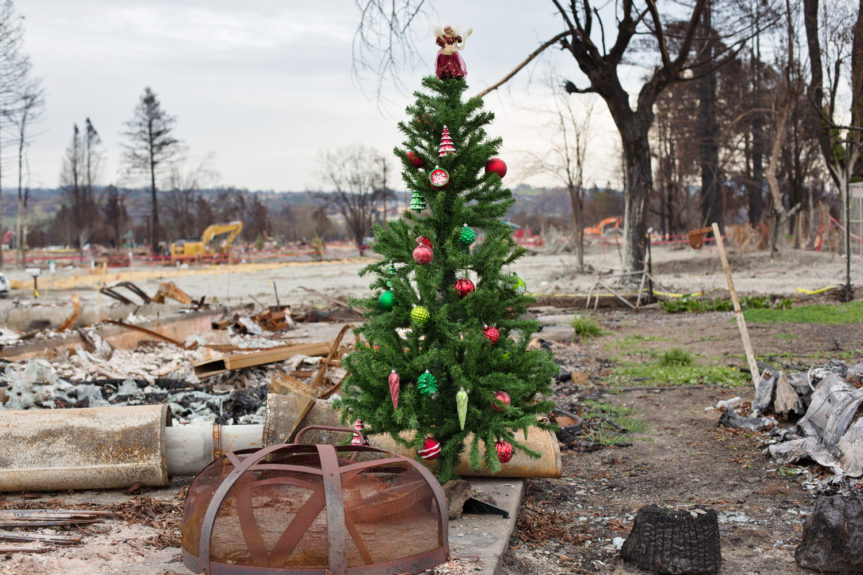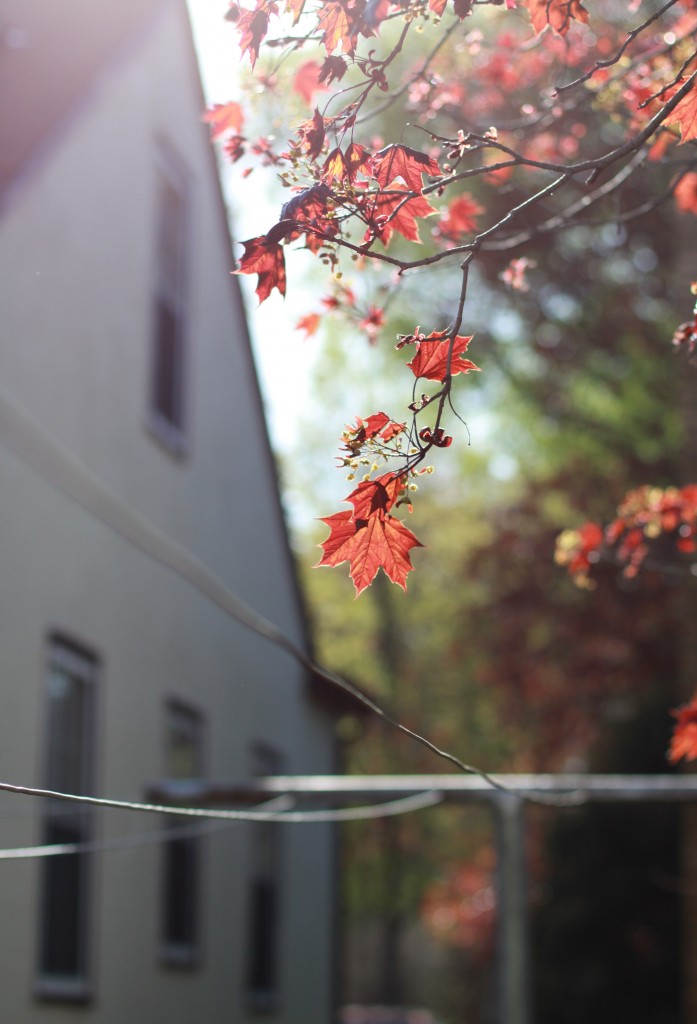Photo by Gina Easley
By Jennifer Richardson
I moved to Los Angeles in 1994, ten months after the Northridge earthquake that killed around fifty people and split the 10 Freeway in two. Despite my absence during that disaster, the specter of a quake has haunted my years in southern California since, most recently when we bought a house in Ventura some seventy miles north of L.A. I remember reading the disclosures that explained the house wasn’t merely in a fault zone—much of Southern California property is—but rather a liquefaction zone. In the event of an earthquake we could expect ground water to rise and transform the soil under the house to quicksand, thus fulfilling a phobia I’d acquired as a kid when the concept of quicksand was first introduced to me in an episode of The Incredible Hulk. That word, liquefaction, was so blunt, so at odds with the Edward-Scissorhands-suburbia aesthetic of the street, that it somehow made it easier to dismiss it as hyperbole.
I mentioned it to my husband who blithely replied that as long as we could get earthquake insurance—we could—he didn’t see a problem. We signed the contract and moved in. Two and half years later the big one came, but instead of an earthquake we got a fire.
•••
California’s largest wildfire in modern history, the Thomas Fire, started on a Monday evening in early December 2017 in the hills above Santa Paula, a sleepy agricultural town with a charming, lost-in-time main street. Fueled by relentless Santa Ana winds, the fire traversed fifteen miles of rugged terrain to consume five hundred structures in the foothills of Ventura on its first of what would go on for thirty-eight nights, culminating in the deadly Montecito mudslides of early January.
In the space of a mile, downtown Ventura slopes from the hills to the Pacific, forming a makeshift amphitheater facing Pierpont Bay. That night residents were compelled to turn their gaze from the sea to the hills. Friends who live on lower ground pulled lawn chairs into their driveway and stayed up all night watching what they described as Hades descending into the city. Earlier that day we had driven up to Berkeley, where I rent an apartment for work, and we didn’t hear about the fire until early the next morning. Alerted by a Facebook message, I turned to Twitter for news: the Hawaiian Gardens, an iconic mid-century apartment building a quarter of a mile from our house, had just burned down.
What followed was a frenzied morning of trying to ascertain if we still had a house—by mid-morning neighbors had confirmed that, for the moment, we did—and what we should do next. My grandparents’ hillside Southern California home had once survived a wildfire when a quick-thinking neighbor emptied his pool onto it, a memory that left me thinking that we at least ought to try to do something. At my urging, my husband agreed to fly down—mostly, I think, to prevent me from going. I dropped him off at the Oakland airport later that morning then called my parents in Florida to tell them we were okay, annoyed that they hadn’t yet called to ask. Despite my father’s penchant for watching Fox News, he seemed completely oblivious to the severity of the situation.
While Doug travelled, we composed a list over email of what he should try to get out if he could reach the house—our neighborhood was under a mandatory evacuation and would remain so for over a week. We’d planned that he would try to retrieve the car we had left in the garage and his passport, but the notion of things you take with you in this kind of situation remained elusive and, in the end, ours was surprisingly prosaic. He nominated some entirely replaceable small household electronics, and I chose a few pieces of jewelry I seldom wore and some photo albums dating from pre-smartphone days that we hadn’t opened in years.
It wasn’t that we didn’t value the contents of our house. Collectively they told a story of our lives, both the things we had brought with us individually to the marriage and those we had acquired together since. To single anything out—say the garage-sale painting that had hung over our sideboard in every house or the mermen Christmas ornaments we’d left permanently hanging on the curtain railing—felt hopelessly arbitrary.
The only other thing we came up with was a gold coin that my father had given us for Christmas a few years earlier. It had no sentimental value and around a thousand dollars of actual value, but we had both immediately thought of it because of what my father, a Trump-voting Republican, had said when he gave it to us. Obama was president at the time, which for him constituted a threat to his family worthy of equipping us all with portable currency and a conspiratorially whispered explanation of “in case you ever need to flee.” He’d acted on an imagined risk and failed to notice a real one. And while it wasn’t for the reason he’d envisioned, it was no less unnerving that my father’s prophecy was coming true.
•••
Doug’s return visit accomplished little other than retrieving our uninspired list of “treasured things” and giving him a chest infection brought on by smoke inhalation. The power was out so he couldn’t stay at the house, but he did skirt the evacuation order to hose it down in those first few days. After a few more nerve-wracking days of being evacuated from motels farther and farther up the coast, he drove back to Berkeley, where we obsessively watched SMS alerts and the Twitter feed of the fire department’s Public Information Officer. We hoped for an estimated containment date but got more red flag warnings.
We returned to Ventura together two weeks after the fire had started to find our house unscathed barring a thick coating of ash. While the fire continued to torment Santa Barbara County, life in Ventura began to resume some normality in the week ahead of Christmas. Air quality was finally good enough to go outside, and everywhere I went, from the dentist to the grocery store, people were telling their own harrowing fire stories. There was a compulsive need to share as a way to exorcise the trauma. Every repetition was therapeutic, an affirmation the still-disbelieving storyteller was okay, even if their belongings weren’t.
In nearby Ojai, a resort town with a tightknit community, artists Sarah Mirk and Lucy Bellwood provided a sanctioned outlet for such storytelling when they hosted a benefit at the local bookstore. Residents read aloud the stories of what they took with them when they evacuated. These ranged from a concert tee-shirt collection to a Purple Heart and were compiled into a zine that was being sold to raise money for people affected by the fire. It was the most meta of mementos: a souvenir about souvenirs.
Despite the worthy cause, I didn’t buy one. The anxiety of the past two weeks had been all-consuming, and I wanted no reminder of it. I was also nagged by the sense of being an impostor, an interloper in this community’s sacred ritual. I was not from Ojai—I was hardly from Ventura, one of seven cities we’d lived in during the last decade and not even the place where I now worked most weeks. I may have been a citizen of the world, but I was also a citizen of nowhere, incapable of partaking fully in either local tragedy or triumph. I adopted my fallback position of consumer, bought a book to support the store—which had been forced to close during the fire—and left the benefit early.
That same week I discovered another breed of fire souvenirs while walking on the boardwalk at the beach. The Ventura County Fairgrounds had been converted into the command center for the Thomas Fire, supporting and housing some of the over 8,500 firefighters that worked the blaze. Along a grassy strip separating the fairground parking lot from the beach, a cottage industry of disaster had sprung up in the form of several tents stocked with Thomas Fire–themed merchandise.
Upon being confronted with a pink tee-shirt bearing the likeness of Santa and his reindeer flying towards a full moon over a photo of the blazing Ventura hills while firefighters look on, capped off with a “Happy New Year 2018” message, my immediate reaction was to recoil. The woman working behind the table was clearly practiced in handling this kind of response and volunteered that the shirts were something firefighters, many of whom were from out of town, could bring their kids as a souvenir. There was a deserved pride associated with fighting what was now on track to be the largest wildfire in California’s history, and the presence of a few uniformed emergency services workers surveying the merchandise at another table lent plausibility to her explanation.
I swallowed my judgement and walked on, mulling over this idea of disaster souvenirs and trying to think of precedents. My sister, who works in law enforcement, had helped clean up after 9/11, and I remembered she’d given my husband a commemorative 9/11 tee-shirt from her squad that Christmas, albeit with a much more understated logo. Did the companies who had set up shop outside the Thomas Fire command center crisscross the country hunting disasters like storm chasers? My subsequent request for an interview with the Santa-over-inferno tee-shirt maker received no response.
•••
Sometime after Christmas, I finally succumbed to the lure of a souvenir from the fire. A local brewery was selling tote bags and tee-shirts to benefit fire victims. I bought the tote, reasoning I can always use another grocery bag, but mostly now really, compulsively wanting it. I attribute my change of heart to wanting a tangible reminder that the trauma of the past few weeks had in fact occurred.
Of course the evidence was all around town, from the charred hillside behind city hall where we often hiked, to rubble-strewn lots lorded over by incongruous chimney stacks. But the path of a wind-driven fire is unpredictable, and its destruction had been haphazard. The fire had left no visible damage in more pockets of the city than not. As spring arrived, the hillsides would green and memories would recede. Here on the patio of the brewery with the 101 Freeway rushing by on one side and a quintessential California blue sky overhead, the possibility of a fire threatening the entire city had already started to seem as implausible as our entire street collapsing into quicksand.
The design of the tote bag had also appealed to me in a way that the Santa-over-inferno tee-shirts had not, but it was peculiar in its own way. Two crossed hands, palms up, hold a black heart that drips what appears to be oil—a strange choice considering the bag is commemorating a fire—over illustrations of local icons: a cactus, a bell tower, our neoclassical city hall. Between the heart and the line drawings a discreet line of text reads “Helping Hands Thomas Fire XII.IV.MMXVII,” the Roman numerals arguably as pretentious as Santa Claus over an inferno is crass.
Despite their differences, both items fulfill two of our keenest contemporary needs—to buy and to broadcast: I was there. Self-conscious of this fact, I’ve yet to use the bag. But it hangs on the coat stand by the front door of my Berkeley apartment, ready to be filled with treasure should I ever need to flee.
•••
JENNIFER RICHARDSON is the author of a memoir, Americashire: A Field Guide to a Marriage. She contributes to Edible Ojai and Ventura County and is working on a lifetime reading plan app, booketlist in her spare time. Find her online at http://jenniferrichardson.net/ and on Twitter @baronessbarren.


 Follow
Follow

